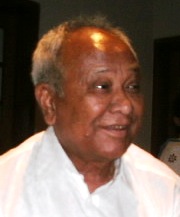Shawkat Ali (politician) facts for kids
Quick facts for kids
Shawkat Ali
|
|
|---|---|
|
শওকত আলী
|
|

Ali in 2012
|
|
| Deputy Speaker of the Jatiya Sangsad | |
| In office 25 January 2009 – 24 January 2014 |
|
| Prime Minister | Sheikh Hasina |
| Preceded by | Akhtar Hameed Siddiqui |
| Succeeded by | Fazle Rabbi Miah |
| Personal details | |
| Born | 27 January 1937 Dighirpar, Naria, Bengal Presidency, British India |
| Died | 16 November 2020 (aged 83) Dhaka, Bangladesh |
| Political party | Awami League |
| Alma mater | University of Dhaka |
| Profession | Army officer, politician |
| Military service | |
| Years of service |
|
| Rank | Colonel |
| Commands | Director of Ordnance Services |
| Battles/wars | Bangladesh Liberation War |
Colonel Shawkat Ali (born January 27, 1937 – died November 16, 2020) was an important politician from Bangladesh. He served as a Deputy Speaker of the Jatiya Sangsad, which is like the parliament or main law-making body of Bangladesh. He was a member of the Awami League political party. Shawkat Ali was also a brave freedom fighter during the Bangladesh Liberation War. He played a role in the events leading up to Bangladesh's independence.
Contents
Early Life and Military Career
Shawkat Ali was born in Shariatpur, which was part of British India at the time, but is now in Bangladesh. He was the oldest of nine children. In 1958, he earned his law degree from Comilla Law College, which was part of the University of Dhaka. The very next year, in 1959, he joined the Pakistan Army as an officer.
The Agartala Case
In 1968, when Shawkat Ali was a captain, he was involved in a major political event known as the Agartala Case. He was one of 35 people accused of planning to separate East Pakistan (which is now Bangladesh) from Pakistan. This case was very important in the history of Bangladesh's fight for independence.
At first, there were plans for a military trial, but the government decided to have a civil trial instead. However, due to strong public protests, the accusations were dropped the following year. Even though the charges were removed, Shawkat Ali had to leave the army in 1969. Later, in 2010, Shawkat Ali shared with the Parliament that he and others had indeed formed a group to work towards East Pakistan's independence.
Role in Bangladesh's Independence
After Bangladesh declared its independence from Pakistan and the war began in 1971, Shawkat Ali rejoined the army. He became part of the Bangladesh Forces, which fought for the country's freedom during the Bangladesh Liberation War.
In 1975, he was a colonel and worked as the Director of Ordnance Services. However, he had to retire from the army for a second time after the assassination of Sheikh Mujibur Rahman. This was because he was known to be close to Sheikh Mujibur Rahman, who was a key leader in Bangladesh's independence.
Political Journey
Shawkat Ali had a long and successful career in politics. He was elected to the parliament many times. He won elections in 1979, 1991, 1996, 2001, and 2008.
During his time in parliament, he worked on various important committees. For example, between 1996 and 2001, he was the chairman of committees like the Standing Committee on Ministry of Shipping. He was also a lawyer who could practice in the Supreme Court of Bangladesh.
In 2009, after the Awami League won a big election, Shawkat Ali was chosen as the Deputy Speaker of the ninth parliament. When the Speaker, Abdul Hamid, became acting President and then President, Shawkat Ali took on the role of Acting Speaker of the National Parliament. He often led parliamentary sessions when the Speaker was not present.
Family and Writings
Shawkat Ali wrote two books about the Agartala Case, one in English and one in Bangla. He was married and had two sons, Firoze Shawkat Ali and Khaled Shawkat Ali, and one daughter, Marina Shawkat Ali.
Passing Away
Shawkat Ali passed away on November 16, 2020, at the age of 83.
 | John T. Biggers |
 | Thomas Blackshear |
 | Mark Bradford |
 | Beverly Buchanan |

